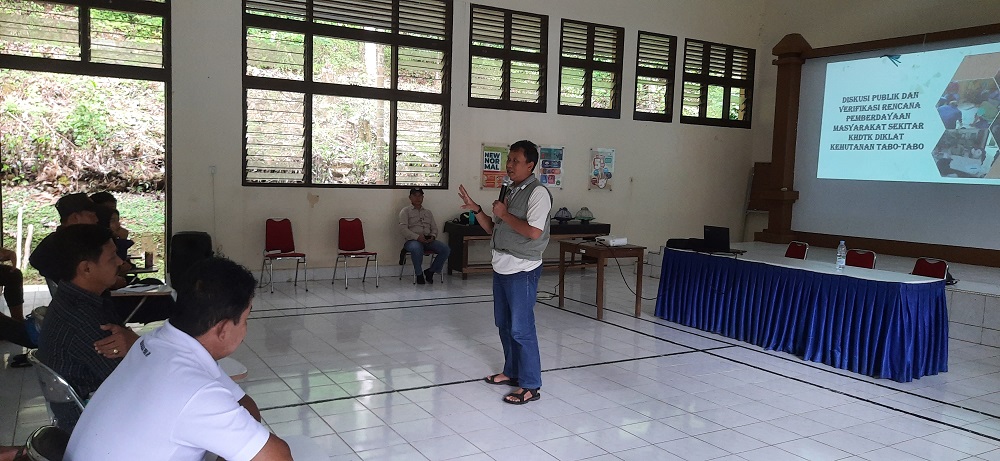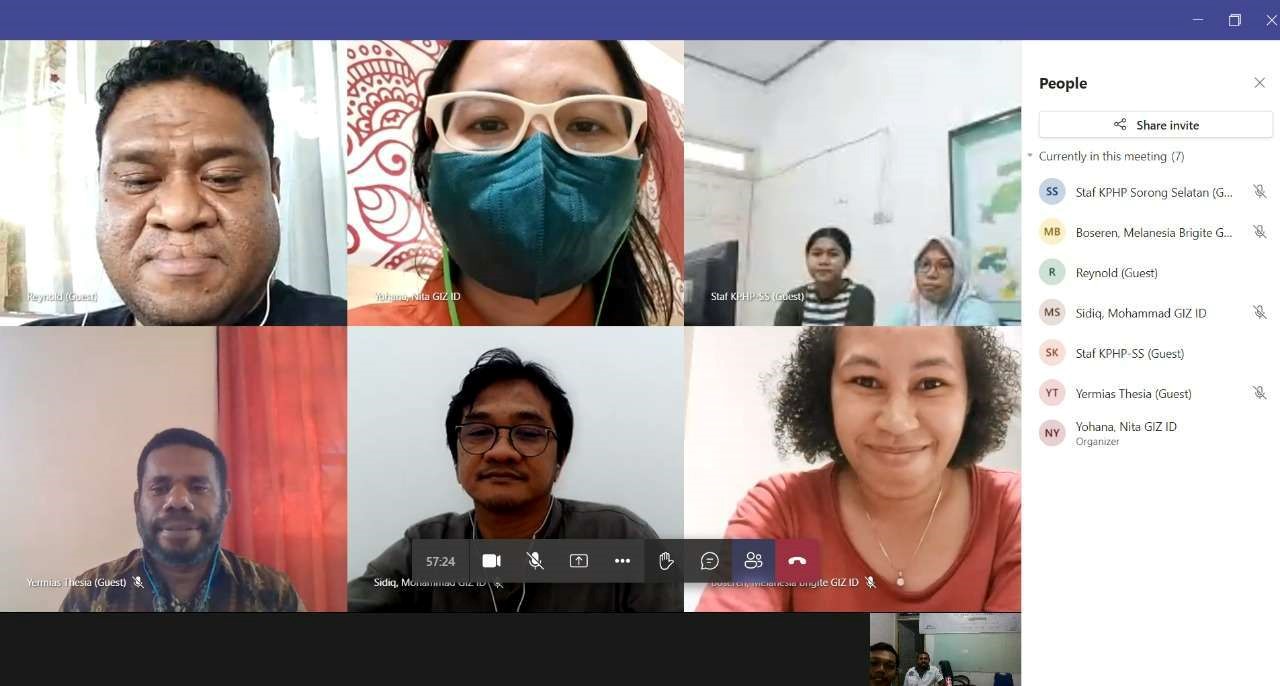FORCLIME
Forests and Climate Change ProgrammeTechnical Cooperation (TC Module)

Select your language

Efforts to manage Education and Training Forests within Special Purpose Forest Areas (KHDTK) are aiming to support the implementation of practically oriented training activities. In addition, Education and Training Forests are also expected to be able to support the economic empowerment of surrounding communities. In order to provide a clearer direction for this kind of community empowerment, the Makassar Environment and Forestry Education and Training Center (BD LHK Makassar) has drawn up a Community Empowerment Plan for the communities living around the Tabo-tabo Education and Training Forest KHDTK for the 2022-2024 period. A Draft Community Empowerment Plan had already been prepared previously, however, a consultation still needed to be held with the general public so that the plan would be able to properly accommodate the aspirations of local stakeholders living in the area.
Therefore, in an effort to improve this vital document, BD LHK Makassar held a Public Consultation on the Draft Community Empowerment Plan at the BD LHK Makassar Campus in the KHDTK Tabo-tabo Training Forest, South Sulawesi on 11 November 2022. The public consultation was opened by the Head of Training Facilities and Evaluation Section, BD LHK Makassar, Mr. Endang Siswanto. The Community Empowerment Plan for communities around the Tabo-tabo KHDTK for the 2022-2024 period presented at this meeting addressed the development of institutional management, area management and business management within the Tabo-tabo Education and Training Forest KHDTK area.
"The meeting activities have been very useful in terms of aligning plans from the BDLHK Makassar with development plans for Tabo-tabo Village," Mr. Hairil Anwar, the Head of Tabo-tabo Village stated after the meeting had been brought to conclusion.
The planned follow-up to this activity is the revision of the Draft Community Empowerment Plan document based on input compiled during the public consultation. The document will then be signed by the Head of the Makassar Environment and Forestry Education and Training Center and will subsequently be made available for stakeholders to read.
For more information, please contact:
Edy Marbyanto, Strategic Area Manager for Human Capacity Development

With the goal of preparing a Long-Term Forest Management Plan (RPHJP) document for the Production Forest Management Unit (KPHP) of Sorong Selatan, the West Papua Provincial Forestry Service held an online meeting on 4 November 2022 that was opened by the Head of KPHP Sorong Selatan, Reynold Kesaulija, S.Hut., M.Si., and attended by FORCLIME, as one of the development partners operating in West Papua Province.
During the meeting, the Head of KPHP Sorong Selatan asked for support for the implementation of forest use planning (tata hutan), which covers various activities, including the subdivision of the area into blocks and plots, the results of which will assist in the preparation of the RPHJP document. In terms of forest governance activities, FORCLIME has pledged its support for the consultation process (coaching clinic). However, this process will be implemented by the South Sorong KPHP in coordination with the Manokwari Forest Area Consolidation Center (BPKH).
In addition, a coaching clinic will be held in order to prepare an RPHJP for all KPHs operating in West Papua Province and is planned for the end of November or early December 2022. During this event, the bio-geophysical and sociocultural data of KPHP Sorong Selatan, which was collected in conjunction with FORCLIME, will be addressed during the discussions.
For more information, please contact:
Nita Yohana, Adviser for Sustainable Forest Management and Coordinator for West Papua Province
Mohammad Sidiq, Strategic Area Manager for Sustainable Forest Management and Coordinator for Papua and West Papua Provinces

Since 2013, FORCLIME has supported various partners in the promotion of sustainable forest management in collaboration with National Geographic Indonesia magazine. This year, 2022, this ongoing collaboration has been highlighting sustainable forest management and biodiversity conservation within the Wasur National Park in Merauke, South Papua. This activity, which is known as Pusparagam Wasur or Diversity of Wasur, has resulted in various products, including features and informative maps that have been published in National Geographic Indonesia (NGI) magazine, as well as short movies that have been uploaded to NGI's social media accounts.
This year's cooperation project differs slightly from those of previous years in that, in addition to the published materials outlined above, training sessions on the preparation and development of virtual tours have also been organized for Wasur National Park staff. As part of the promotional activities of national parks, virtual tours of national parks and ecotourism destinations are seen as the most effective media through which to promote ecotourism and a post-pandemic "new normal lifestyle". Through such activities, information about the Wasur National Park can be disseminated more widely.
In order to collect data and information, the NGI Team undertook an expedition to the Wasur National Park from 19 October to 1 November 2022. The first three days of Pusparagam Wasur's journey began with a training session in the preparation and development of a virtual tour of the Wasur National Park, which was attended by national park staff. The participants in the training session had the opportunity to improve their levels of expertise and skills as regards the making of short movies aimed at promoting the national park.
The expedition got underway at Kampung Rawa Biru, one of the national park-supported villages. This place became the starting point for the NGI Team in terms of the taking of pictures and the conducting of interviews with several community leaders. Among the locations visited were Youram Savana, Dolgamit Swamp and Tomer Beach, which are famed for their panoramic photo opportunities, wildlife viewing, wetland landscapes and migratory bird watching. In addition, the expedition also visited FORCLIME-assisted villages in the Wasur National Park, namely the villages of Yanggandur and Wasur. In Yanggandur, the team covered women's group activities that involved the production of non-timber forest products, including trigona honey (honey from stingless bee cultivation), ants’ nest tea (a herbal drink made from epiphytic plants of the genus myrmecodia) and eucalyptus oil. Meanwhile, in Wasur, the team covered the Sasi tradition (which comprises a set of customary rules that regulate a prohibition on the taking of natural resources from certain locations or hamlets during certain periods). Sasi is closely related to respect for relatives who have previously passed away. The ceremony that was performed during the visit revoked the most recent Sasi, which was instantiated a year after the death of a relative. The Sasi custom manages the area in an indirect way, allowing time for natural resources to grow back and restore their populations.
The results of the Pusparagam Wasur expedition will be published in the January 2023 edition of National Geographic Indonesia magazine and the hope is that information about the Wasur National Park will be widely disseminated among the magazine’s readership and reach a significant national audience. In addition, the short movies that have resulted from this collaboration will be uploaded to NGI's social media pages in the hope of reaching a younger generation.
For more information, please contact:
Mohammad Sidiq, Strategic Area Manager for Sustainable Forest Management and Coordinator for Papua and West Papua Provinces
Ratu Wina Widyawati, Programme Officer for Knowledge Management
 |
Supported By: |
  |